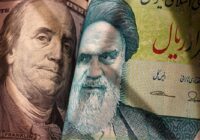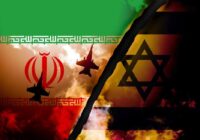One voice in the media realizes that Palestinians have been getting the silent treatment from the US.
Demonstrating both his deep admiration and extreme impatience, Columbia University Professor Hamid Dabashi reacts on Al Jazeera to an article by Michelle Alexander, a recently hired columnist at The New York Times. Her title speaks for itself: “Time to Break the Silence on Palestine.” Dabashi agrees with the point she is making. But in his eyes the glaring problem is less the unenviable fate of the Palestinian people, which has been documented for decades, than the nature of the silence that Alexander has decided to break.
Puzzled by the appearance of this article in The Times in the year 2019, Dabashi asks: “‘Silence?’ Really? What silence? Whose silence? Who has been silent and who has spoken the truth? Has the world been silent, or has Ms Alexander been silent? These are two vastly different things.”
Here is today’s 3D definition:
Silence:
The absence of sound caused either by the absence of a source of sound or the suppression of that source’s ability to produce sound
Contextual note
Dabashi explains how this article would be vastly improved if it examined the cause of the suppression — the designated silence — at the same time as it described what was suppressed. He provides the missing analysis. It is clearly about the source’s inability to produce sound. The source is US political and media culture in general, of which The New York Times is considered a paragon. Obviously both US culture and The NYT have the ability to produce sound, but Dabashi demonstrates that there are some configurations of sound they are not allowed to utter. Sounds of sympathy for the plight of the Palestinian people, for example.
Alexander proudly cites Martin Luther King’s breaking of the silence on Vietnam in 1967 as a precedent for her initiative. But the Vietnam War had been gradually escalating for just over two years when King risked his reputation by addressing an issue deemed by the Johnson administration to be outside the narrow scope of civil rights, MLK’s “reserved domain.” In the US, moral leaders — especially if members of a minority — are expected to stay focused on their unique problems, not on morality itself.
By contrast, the oppression of the Palestinians, which every US administration has tolerated out of loyalty to Israel, has been going on for decades, allowing Alexander and The NYT sufficient time to notice. And, while US government officials obviously keep track of the events, the media have consistently imposed a deafening silence justified by a kind of mystical commitment to Israel and all Israeli governments, however brutal, inhuman and guilty of violating international law some of them have chosen to be.
Historical note
Dabashi traces the roots of the persistent silence on Palestine to US political culture in the early 19th century, when French nobleman Alexis de Tocqueville so brilliantly examined democracy in America, admiring its institutions while deconstructing its culture. Tocqueville observed that “In America, when the majority has once irrevocably decided a question, all discussion ceases.” He added, “I know no country in which there is so little true independence of mind and freedom of discussion as in America.”
Although Tocqueville had no way of knowing it, the principle extends to the modern media, who make sure the rule of silence is observed. Dabashi quotes the Frenchman on how the silence is enforced: “[T]he majority raises formidable barriers around the liberty of opinion; within these barriers an author may write what he pleases, but woe to him if he goes beyond them.”
 CNN’s recent firing of journalist Marc Lamont Hill illustrates the principle to perfection. Terminated by CNN after calling for justice for Palestinians in a speech at the United Nations, US media either used the occasion to accuse Hill of anti-Semitism or avoided mentioning it altogether. The Guardian, not The New York Times or The Washington Post, invited American author Cornel West to comment on this shameful dismissal.
CNN’s recent firing of journalist Marc Lamont Hill illustrates the principle to perfection. Terminated by CNN after calling for justice for Palestinians in a speech at the United Nations, US media either used the occasion to accuse Hill of anti-Semitism or avoided mentioning it altogether. The Guardian, not The New York Times or The Washington Post, invited American author Cornel West to comment on this shameful dismissal.
Israeli journalist Gideon Levy described the circus of anti-Semitic accusations against Hill as a “well-orchestrated hysteria.” Levy’s article titled, “In U.S. Media, Israel is Untouchable” would never have been allowed in mainstream media in the US. Americans would’ve had to go online to read it on the site of Israeli newspaper Haaretz, where debate about Israel’s policies is allowed, proving Tocqueville’s point about the absence of “freedom of discussion in America.”
Dabashi characterizes the US treatment of the Palestinian drama as “American provincialism” or “parochialism.” This attitude, traditionally associated with isolationism, could have made partial sense in Tocqueville’s 19th century, when the young nation was seeking to remove itself as much as possible from the influence of European colonial powers.
But having become the unique, uncontested global empire, described by Donald Trump in this week’s State of the Union as a nation with which “nothing anywhere in the world … can compete” as well as “the hope and the promise and the light and the glory among all the nations of the world,” provincialism and parochialism have no place. If as Trump says, “Great nations do not fight endless wars,” meaning the US intends to end its military presence in the Middle East, the Trump administration might at last look at the means of preventing the continuation of the endless war inside Israel’s borders.
Yet that is something on which Trump, the media and nearly the entire political class (including Democrats) intend to remain silent.
*[In the age of Oscar Wilde and Mark Twain, another American wit, the journalist Ambrose Bierce, produced a series of satirical definitions of commonly used terms, throwing light on their hidden meanings in real discourse. Bierce eventually collected and published them as a book, The Devil’s Dictionary, in 1911. We have shamelessly appropriated his title in the interest of continuing his wholesome pedagogical effort to enlighten generations of readers of the news.]
The views expressed in this article are the author’s own and do not necessarily reflect Fair Observer’s editorial policy.
Support Fair Observer
We rely on your support for our independence, diversity and quality.
For more than 10 years, Fair Observer has been free, fair and independent. No billionaire owns us, no advertisers control us. We are a reader-supported nonprofit. Unlike many other publications, we keep our content free for readers regardless of where they live or whether they can afford to pay. We have no paywalls and no ads.
In the post-truth era of fake news, echo chambers and filter bubbles, we publish a plurality of perspectives from around the world. Anyone can publish with us, but everyone goes through a rigorous editorial process. So, you get fact-checked, well-reasoned content instead of noise.
We publish 2,500+ voices from 90+ countries. We also conduct education and training programs
on subjects ranging from digital media and journalism to writing and critical thinking. This
doesn’t come cheap. Servers, editors, trainers and web developers cost
money.
Please consider supporting us on a regular basis as a recurring donor or a
sustaining member.
Will you support FO’s journalism?
We rely on your support for our independence, diversity and quality.






